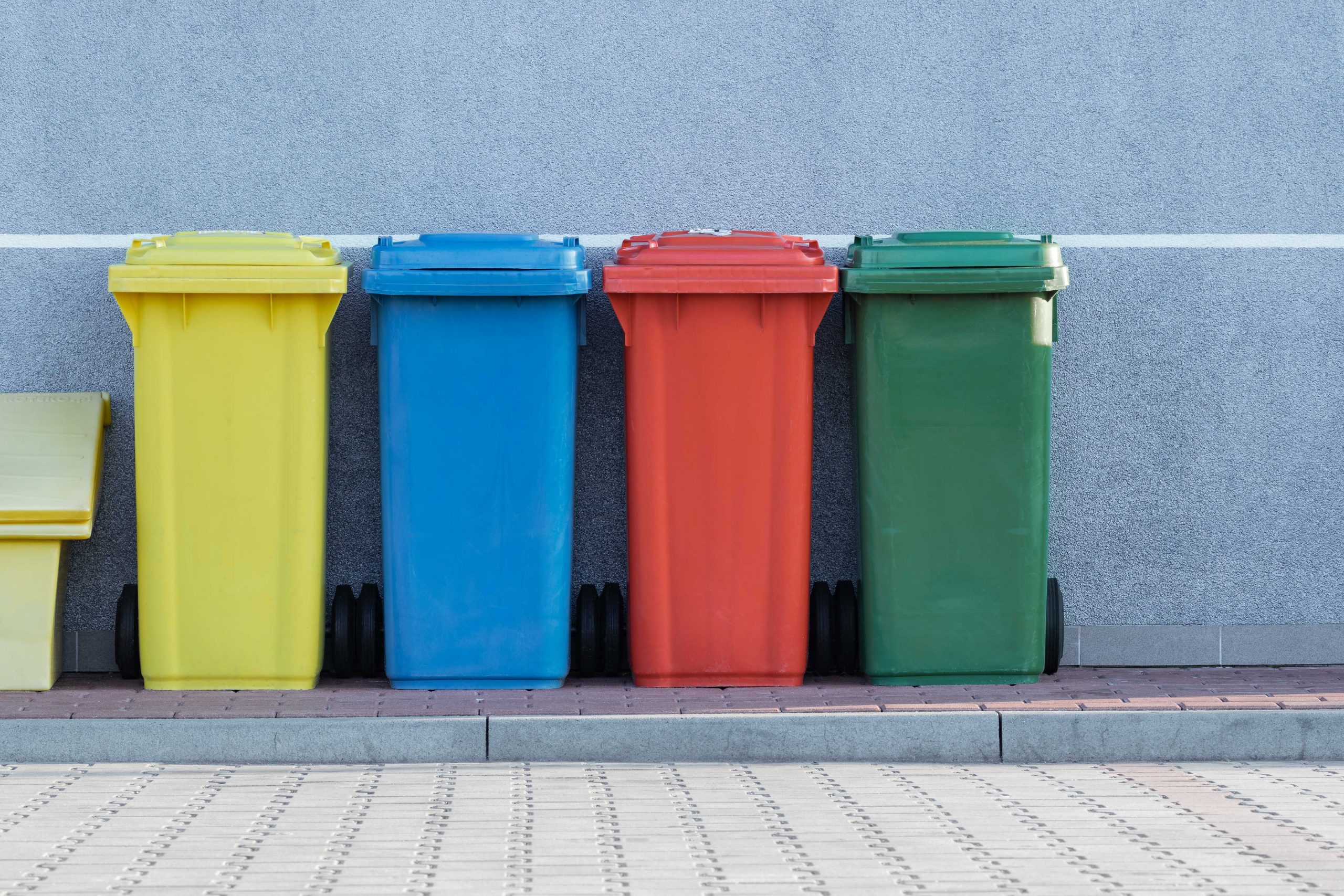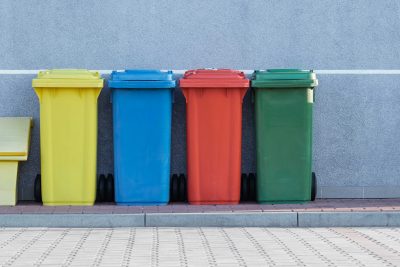
10 easy sustainability tips
10 easy sustainability tips you can incorporate into your everyday life
We can get caught up in our lives and sometimes fail to register, we can implement simple practices and habits into our lives that will help the environment and lessen the effects of global warming. To be sustainable, here are 10 easy tips that can be followed every day for those of us conscious and want to make real change and save our future.

Rubbish bins Photo by Pawe? Czerwi?ski on Unsplash
- Buy a water bottle/ get a water filter jug
A worthy investment, buying a water bottle and using a water filter jug are both key ways to save money and the environment in one fell swoop. Water bottles can save you from buying bottled drinks outside, and Clean Up Australia professes the harms of plastic bottles can be far-reaching, citing plastic waste, the burning of fossil fuels in bottled water transportation, the fact many of the bottles end up in landfill and may take up 1000 years to decompose, and the fact that 90% of the cost of a water bottle can be traced back to the bottle, lid and label(“Bottled Water”, 2020). It’s also so much easier to have filtered water always available at home, and it’s easy to pull a water bottle out of your bag. A small step that can have far-reaching impacts. - Compost coffee grind, use as fertiliser, get a home garden
A lot of Australians love their coffee, so why not put the leftover coffee grind to good use? Gardening Australia proposes using coffee grind as a compost fertiliser, where coffee grinds mixed with organic waste producing nutrients for a home garden. With Australian cafés producing on average about 80kg of coffee grounds each week that often ends up in landfill, doing our bit to make sure the byproducts of our consumer behaviour are put to good use should be a definite point of emphasis(“Coffee Compost”, 2018). Also, home gardens are great fun, you should try it. - Avoid the plastic bags, get a trustee supermarket bag
The harm of the plastic bag is definitely something Australia has tried to address, with supermarkets increasingly not offering single-use plastic bags. It’s a good first step, and Australians should buy into this. Having your own supermarket bag is something that saves money and helps wild animals from choking to death on these plastic items. Saving the environment and reducing wildlife death? Sign me up. - Use recycled paper
Despite technology becoming more and more ingrained within our daily lives, the paper is still useful and necessary to all of us, for work and even leisure. ThoughtCo. have listed the benefits of paper recycling, and state that recycling one ton of paper can save 17 trees, 7,000 gallons of water, 380 gallons of oil, 3.3 cubic yards of landfill space and 4,000 kilowatts of energy — enough to power the average U.S. home for six months — and reduce greenhouse gas emissions by one metric ton of carbon equivalent (MTCE)(West, 2019). It’s a wonder why most of us aren’t doing it, and recycled paper is available in local office supply stores, make sure to use them. - Don’t leave the electricity on or on standby
It’s an obvious thing but it helps the environment immensely. Pulling out cables from wall sockets, flicking the lights off, not leaving anything on standby are all things we can do within our household that requires us to be careful and not lazy. Every little bit counts and it’s a simple thing to be conscious of that can make such a huge difference in the long run. Also, it’ll cut down your bills, so that’s neat, isn’t it? - Use cloth napkins instead of throwaway tissues
One time usage items should be avoided, and tissues and wipes are classic culprits of such items within our daily lives. Cloth napkins can be washed and used again, and just like this, opting for reusable options rather than throwaway ones can reduce our carbon footprint massively. Waste less. - Change your food and drink consumption habits outside
I actually found bio cutlery fairly recently after I got some takeaway, and the packaging for the cutlery mentioned bio cutlery. It’s an ingenious idea, and similar things have been implemented with reusable straws and the like becoming more commonplace. A bio cutlery company in BioPak claims their products are made from plant-based bioplastic or FSC wood pulp and have a smaller carbon footprint than plastic cutlery, and are heat-resistant and sturdy(“Cutlery”, 2020). Reusable straws would also lessen plastic consumption and waste. Hell, even a lunchbox would do wonders in comparison to buying plastic containers that are gonna be thrown away. Simple steps in food and drink consumption can make a difference. Make sure to make the right choices. - Walk and cycle, or use public transport or car-sharing
It’s a simple and easy thing to do, walk or cycle short to medium distances, and use public transport and car-sharing for longer ones. Walking or cycling obviously has health benefits and reduces cost, and public transport or carpooling is a much better alternative to driving by yourself. Stay fit, and keep the environment fit too. - Go Solar
This is probably by far the most difficult thing on the list but does consider going solar as it can be one of the major lasting impacts of your electricity usage. Maybe when moving into a new home, consider solar and other renewable energy sources. Even on a smaller scale, use solar battery packs to recharge your phone, and EnergySage claims on average it can be cheaper as well. Despite its notoriety, renewable resources like solar and wind only contribute some two to three per cent of global energy capacity(Richardson, 2020). Let’s bump that percentage up. - Opt for natural cooling instead of aircon
A study about air conditioners finds the typical window and split units used in most homes – are set to account for over 130 gigatons (GT) of CO2 emissions between now and 2050 and that would account for 20-40% of the world’s remaining “carbon budget”(Campbell et al., 2018). Using natural cooling solutions such as opening windows or using blinds can help weather the heat of the summer, and keep the world stronger and more sustainable.
References
Bottled Water. Clean Up Australia. (2020). Retrieved 23 October 2020, from https://www.cleanup.org.au/newpage.
Campbell, I., Kalanki, A., & Sachar, S. (2018). Solving the Global Cooling Challenge. Rocky Mountain Institute. Retrieved from https://rmi.org/wp-content/uploads/2018/11/Global_Cooling_Challenge_Report_2018.pdf
Coffee Compost. GARDENING AUSTRALIA. (2018). Retrieved 23 October 2020, from https://www.abc.net.au/gardening/factsheets/coffee-compost/10089756#:~:text=Coffee%20grounds%20are%20high%20in,for%20use%20in%20the%20garden.
Cutlery. Biopak. (2020). Retrieved 23 October 2020, from https://www.biopak.com.au/products/cutlery.
Richardson, L. (2020). Solar Energy vs Fossil Fuels: How Do They Compare? | EnergySage. Solar News. Retrieved 23 October 2020, from https://news.energysage.com/solar-energy-vs-fossil-fuels/#:~:text=In%20terms%20of%20environmental%20impact,with%20its%20non%2Drenewable%20counterparts.
West, L. (2019). What Are the Benefits of Recycling Paper?. ThoughtCo. Retrieved 23 October 2020, from https://www.thoughtco.com/the-benefits-of-paper-recycling-1204139.
